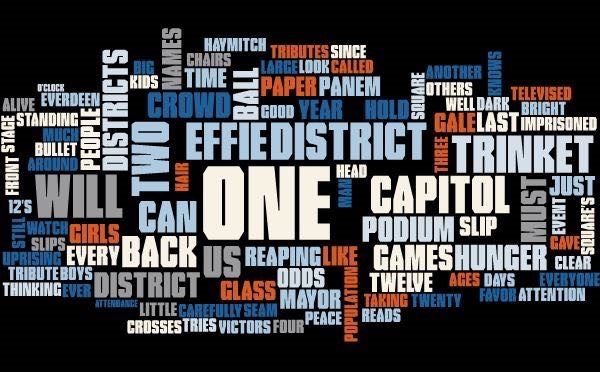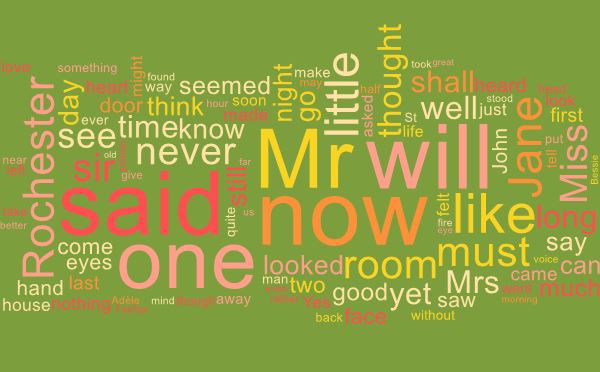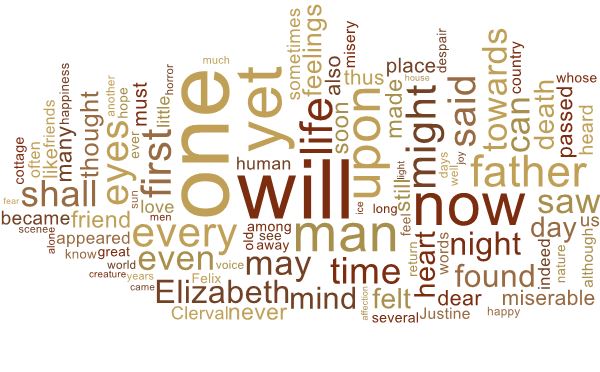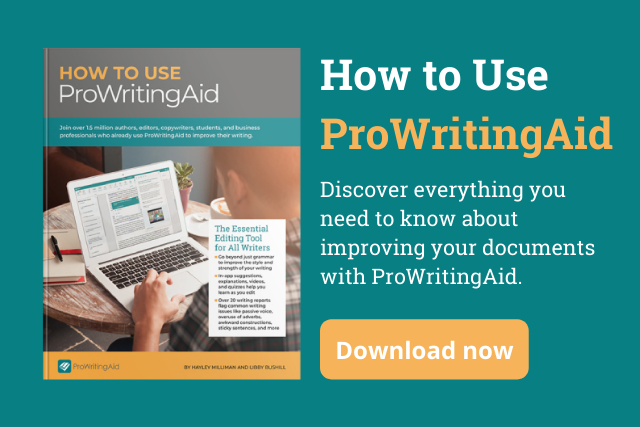
Looking to learn more about how ProWritingAid works? Our new eBook gives you all the information you need to start editing like a pro with ProWritingAid.
Download to learn how to customize your settings, use each of our 20+ in-depth reports, install our many integrations, and how you can get the most out of your ProWritingAid subscription.
What is a Word Cloud?
Google says a word cloud is “an image composed of words used in a particular text or subject, in which the size of each word indicates its frequency or importance.”
So, the more often a specific word appears in your text, the bigger and bolder it appears in your word cloud.
ProWritingAid has a Word Cloud Gallery that makes it easy to create word clouds based on the text you paste into the tool. Here’s what a word cloud based on the reaping scene in the first chapter of The Hunger Games looks like:

Below are a couple other word clouds. Can you recognise the novels from their word clouds?


Or, if you are up for a challenge, try our Word Cloud Game. Guess 10 classic novels from the word clouds that they generate.
Word Clouds For Fiction Writers
Every writer has words they like to use over and over. When we edit our own words, it's hard to see what our overused words are. But when we use them too often, our writing sounds redundant. A word cloud can help you identify your overused words. The most commonly used words are the biggest. It's easy to see if the big words are the words you want to use the most.
Do you have too many dialogue tags? If so, "said" will show up as a larger word. You can then go find places in your writing to add action or emotion beats. Do your characters smirk or shrug all the time? A word cloud can help you find the actions you repeat too often.
A word cloud can also make sure you are focusing on the right characters, themes, and plot points. If your book is about Jane, but Jack's name is three times bigger, you might need to re-evaluate your manuscript. If your book is about a war, but the words "war" and "battle" are tiny on your word cloud, you'll need to develop that plot more.
Word Clouds For Copywriters And Bloggers
Search engine optimization. It can be the bane of copywriters and bloggers everywhere. The algorithms are always changing. But it doesn't have to be a mystery. The most important part of SEO is keywords.
Run your copy or blog post through a word cloud generator. Are your target keywords huge or tiny? What words have you inadvertently turned into SEO keywords? This will help you figure out exactly what edits you need to make to reach those high search engine rankings.
When To Use Word Clouds
For fiction, you can use word clouds of different scenes to compare how your characters feel about the inciting action. A word cloud will help you notice right away if your characters’ reactions are similar in both scenes. You’ll be able to identify where you should have a new reaction or a new emotion.
For business purposes, word clouds can help you find your customers’ pain points. If you collect feedback from your customers, you can generate a word cloud using customers’ language to help identify what is most important to them. Imagine if “long wait time” cropped up as major emphasis words in customer feedback. That should ring a warning bell.
If you are in the business-to-consumer writing industry, a word cloud will highlight overuse of technical jargon. You can make sure your language is accessible to consumers with a quick visual model.
When Not To Use Word Clouds
Simply dumping a scene from your current work in progress into a word cloud generator might show you that you used “said” a lot, but won’t give you the insights you want. But using word clouds to compare your scenes against each other can show you where they’re too similar, use too many of the same unimportant word choices, or simply aren’t consistent between scenes when they need to be.
Likewise, in copywriting for business, you wouldn’t use a word cloud when your content isn't optimized for keywords. A word cloud on a blog post that’s not SEO enhanced won’t tell you much about your keyword density.
No matter what you're writing, word clouds are something to use as a last step in your writing process. Word choice falls under "line edits." If you have an unedited first draft, word clouds won't help you much. You'll likely need to make major structural changes before you use a word cloud.
Final Thoughts
Word clouds are fun to use as a visual aid with blog posts to underscore the keywords on which you’re focusing. Your readers will notice the larger, bold words and understand their importance to your post.
And for fiction writers, word clouds are great to make sure you’re focusing on the right words in your prose. It’s also interesting to see some of the word clouds that other writers have created.
Play our Word Cloud Game here.
How do you see word clouds helping your writing? Let us know if you’re a fiction writer or copywriter and how you might use a word cloud.
Or if you’ve already created a word cloud on ProWritingAid.com, let us know what insights you gained from it.
In the meantime, happy writing!



